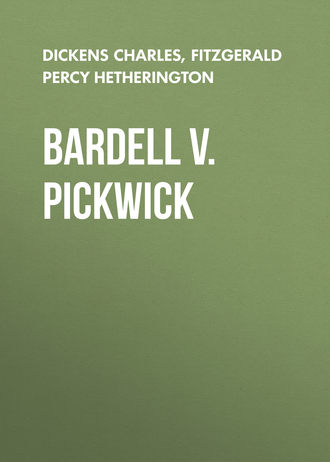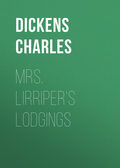
Чарльз Диккенс
Bardell v. Pickwick
THE PLAINTIFF’S CASE
It was really of a very flimsy kind but “bolstered-up” and carried through by the bluster of the serjeant and the smartness of his junior. It rested first on a dialogue between Mr. Pickwick and his landlady which was overheard, in fact by several persons; second, on a striking situation witnessed by his three friends who entered unexpectedly and surprised him with Mrs. Bardell in his arms; third, on some documentary evidence, and lastly, on a damaging incident disclosed by Winkle.
The first witness “put in the box,” was Mrs. Martha Cluppins – an intimate friend of the plaintiffs.
We know that she was sister to Mrs. Raddle, who lived far away in Southwark, and was the landlady of Mr. Sawyer. She might have been cross-examined with effect as to her story that she had been “out buying kidney pertaties,” etc. Why buy these articles in Goswell Street and come all the way from Southwark? What was she doing there at all? This question could have been answered only in one way – which was that the genial author fancied at the moment she was living near Mrs. Bardell.
Besides this, there was another point which Snubbin, in cross-examination, ought to have driven home. Mrs. Cluppins was of an inferior type, of the common washerwoman or “charing” sort; her language was of Mrs. Gamp’s kind; “which her name was” so and so. Yet, this creature, in another room, or on the stairs, the door being “on the jar,” can repeat with her limited appreciation, those dubious and imperfect utterances of Mr. Pickwick! How could she remember all? Or could she understand them? Impossible! She, however, may have caught up something.
Winkle, too, said he heard something as he came up the stairs – “Compose yourself my dear creature, for consider if any one were to come,” etc. But what could be the value of evidence heard in this way? Would a jury believe it? “Not only,” as Sam said, “is ‘wision limited,’” but hearing also.
In short, the delicate subtleties of the conversation between Mr. Pickwick and Mrs. Bardell would be wholly lost in her hands. Persons of her class know nothing of suggestion or double meanings or reserved intention, everything for them must be in black and white. How unlikely, therefore, that through the panels of a door or through the half opened door, (“she said on the jar,”) could she catch the phrases and their meanings, and, above all, retain them in her memory? No doubt, as the counsel put it bluntly, she listened, and with all her ears.
However this may be, here is what Mrs. Cluppins deposed to:
‘Mrs. Cluppins,’ said Serjeant Buzfuz, ‘pray compose yoursel, ma’am;’ and, of course, directly Mrs. Cluppins was desired to compose herself she sobbed with increased violence, and gave divers alarming manifestations of an approaching fainting fit, or, as she afterwards said, of her feelings being too many for her.
‘Do you recollect, Mrs. Cluppins?’ said Serjeant Buzfuz, after a few unimportant questions – ‘do you recollect being in Mrs. Bardell’s back one pair of stairs, on one particular morning in July last, when she was dusting Mr. Pickwick’s apartment?’
‘Yes, my Lord and jury, I do,’ replied Mrs. Cluppins.
‘Mr. Pickwick’s sitting-room was the first floor front, I believe?’
‘Yes it were, sir,’ replied Mrs. Cluppins.
‘What were you doing in the back room, ma’am?’ inquired the little judge.
‘My Lord and jury,’ said Mrs. Cluppins, with interesting agitation, ‘I will not deceive you.’
‘You had better not, ma’am,’ said the little judge.
‘I was there,’ resumed Mrs. Cluppins, ‘unbeknown to Mrs. Bardell; I had been out with a little basket, gentlemen, to buy three pounds of red kidney pertaties, which was three pound, tuppense ha’penny, when I see Mrs. Bardell’s street door on the jar.’
‘On the what?’ exclaimed the little judge.
‘Partly open, my Lord,’ said Serjeant Snubbin.
‘She said on the jar,’ said the little judge with a cunning look.
‘It’s all the same, my lord,’ said Serjeant Snubbin. The little judge looked doubtful, and said he’d make a note of it. Mrs. Cluppins then resumed —
‘I walked in, gentlemen, just to say good mornin’, and went in a permiscuous manner up-stairs, and into the back room. Gentlemen, there was the sound of voices in the front room, and – ’
‘And you listened, I believe, Mrs. Cluppins,’ said Serjeant Buzfuz.
‘Beggin’ your pardon, sir,’ replied Mrs. Cluppins, in a majestic manner, ‘I would scorn the haction. The voices was very loud, sir, and forced themselves upon my ear.’
‘Well, Mrs. Cluppins, you were not listening, but you heard the voices. Was one of those voices Mr. Pickwick’s?’
‘Yes, it were, sir.’
And Mrs. Cluppins, after distinctly stating that Mr. Pickwick addressed himself to Mrs. Bardell, repeated by slow degrees, and by dint of many questions the conversation with which our readers are already acquainted.
Now we have to turn back to one of the earlier passages in the story for the conversation between the pair, “with which the reader is already acquainted.” Thus we shall know what Mrs. Cluppin’s might have heard.
Mr. Pickwick paced the room to and fro with hurried steps, popped his head out of the window at intervals of about three minutes each, constantly referred to his watch, and exhibited many other manifestations of impatience, very unusual with him. It was evident that something of great importance was in contemplation, but what that something was not even Mrs. Bardell herself had been enabled to discover.
‘Mrs. Bardell,’ said Mr. Pickwick at last, as that amiable female approached the termination of a prolonged dusting of the apartment.
‘Sir,’ said Mrs. Bardell.
‘Your little boy is a very long time gone.’
‘Why, it’s a good long way to the Borough, sir,’ remonstrated Mrs. Bardell.
‘Ah,’ said Pickwick, ‘very true; so it is.’
Mr. Pickwick relapsed into silence, and Mrs. Bardell resumed her dusting.
‘Mrs. Bardell,’ said Mr. Pickwick, at the expiration of a few minutes.
‘Sir,’ said Mrs. Bardell again.
‘Do you think it’s a much greater expense to keep two people, than to keep one?’
‘La, Mr. Pickwick,’ said Mrs. Bardell, colouring up to the very border of her cap, as she fancied she observed a species of matrimonial twinkle in the eyes of her lodger, ‘La, Mr. Pickwick, what a question!’
‘Well, but do you?’ inquired Mr. Pickwick.
‘That depends – ’ said Mrs. Bardell, approaching the duster very near to Mr. Pickwick’s elbow, which was planted on the table; ‘that depends a good deal upon the person, you know, Mr. Pickwick; and whether it’s a saving and careful person, sir.’
‘That’s very true,’ said Mr. Pickwick, ‘but the person I have in my eye (here he looked very hard at Mrs. Bardell) I think possesses these qualities; and has, moreover, a considerable knowledge of the world, and a great deal of sharpness, Mrs. Bardell; which may be of material use to me.’
‘La, Mr. Pickwick,’ said Mrs. Bardell; the crimson rising to her cap-border again.
‘I do,’ said Mr. Pickwick, growing energetic, as was his wont in speaking of a subject which interested him, ‘I do, indeed; and to tell you the truth, Mrs. Bardell, I have made up my mind.’
‘Dear me, sir,’ exclaimed Mrs. Bardell.
‘You’ll think it very strange, now,’ said the amiable Mr. Pickwick, with a good humoured glance at his companion, ‘that I never consulted you about this matter, and never even mentioned it, till I sent your little boy out this morning, eh?’
Mrs. Bardell could only reply by a look. She had long worshipped Mr. Pickwick at a distance, but here she was, all at once, raised to a pinnacle to which her wildest and most extravagant hopes and never dared to aspire. Mr. Pickwick was going to propose – a deliberate plan, too – sent her little boy to the Borough, to get him out of the way – how thoughtful – how considerate!’
‘Well,’ said Mr. Pickwick, ‘what do you think?’
‘Oh, Mr. Pickwick,’ said Mrs. Bardell, trembling with agitation, ‘you’re very kind, sir.’
‘It’ll save you a good deal of trouble, won’t it?’ said Mr. Pickwick.
‘Oh, I never thought anything of the trouble, sir,’ replied Mrs. Bardell; ‘and, of course, I should take more trouble to please you then, than ever; but it is so kind of you, Mr. Pickwick, to have so much consideration for my loneliness.’
‘Ah, to be sure,’ said Mr. Pickwick; ‘I never thought of that. When I am in town, you’ll always have somebody to sit with you. To be sure, so you will.’
‘I’m sure I ought to be a very happy woman,’ said Mrs. Bardell.
‘And your little boy – ’ said Mr. Pickwick.
‘Bless his heart,’ interposed Mrs. Bardell, with a maternal sob.
‘He, too, will have a companion,’ resumed Mr. Pickwick, ‘a lively one, who’ll teach him, I’ll be bound, more tricks in a week than he would ever learn in a year.’ And Mr. Pickwick smiled placidly.
‘Oh, you dear – ’ said Mrs. Bardell.
Mr. Pickwick started.
‘Oh, you kind, good, playful dear,’ said Mrs. Bardell; and without more ado, she rose from her chair, and flung her arms round Mr. Pickwick’s neck, with a cataract of tears, and a chorus of sobs.
‘Bless my soul,’ cried the astonished Mr. Pickwick; – ‘Mrs. Bardell, my good woman – dear me, what a situation – pray – consider, Mrs. Bardell, if anybody should come.’
‘O, let them come,’ exclaimed Mrs. Bardell, frantically.
‘I’ll never leave you, dear, kind, good soul.’ And with these words Mrs. Bardell clung the tighter.
Every utterance of the little Judge is in character, from his first directions “go on.” His suspicious question, “what were you doing in the back room, ma’am?” – and on Serjeant Buzfuz’s sudden pause for breath, when “the silence awoke Mr. Justice Stareleigh, who immediately wrote down something, with a pen without any ink in it, and looked unusually profound, to impress his jury with the belief that he always thought most deeply with his eyes shut.” Also when at the “on the jar” incident – he “looked doubtful, but said he’d make a note of it.” So when Sam made one of his free and easy speeches, the Judge looked sternly at Sam for fully two minutes, but Sam’s features were so perfectly calm that he said nothing. When Sam, too, made his witty reposte to Buzfuz as to his “wision being limited,” we are told that there was a great laugh – that even “the little Judge smiled:” a good touch, for he enjoyed, like other judges, seeing his learned brother get a fall – ’tis human nature.
It must be said the impression of a listener, who had heard all this could have been anything but favourable to Mr. Pickwick. No doubt there was his paternally benevolent character to correct it: but even this might go against him as it would suggest a sort of hypocrisy. Even the firmest friends, in their surprise, do not pause to debate or reason; they are astonished and wonder exceedingly.
WINKLE’S EVIDENCE
Skimpin may have been intended for Wilkin, a later Serjeant and well-known in the ’fifties, and whose style and manner is reproduced. We could not ask a better junior in a “touch and go” case. He was as ready to take advantage of any opening as was the late Lord Bowen, when he was junior in the Tichborne case.
On entering the Box, Mr. Winkle “bowed to the Judge,” with considerable deference, a politeness quite thrown away. “Don’t look at me sir,” said the Judge sharply, “look at the Jury.” This was ungracious, but judges generally don’t relish any advances from witnesses or others.
When poor Winkle was accused by the Judge of giving his name as Daniel, he was told that “he had better be careful:” on which the ready Skimpin: “Now, Mr. Winkle attend to me if you please: and let me recommend you, for your own sake, to bear in mind his lordship’s injunction to be careful.” Thus by the agency of Judge and counsel witness was discredited at starting and of course flurried.
‘I believe you are a particular friend of Pickwick, the defendant, are you not?
Winkle, eager to retrieve himself by being “careful” began —
‘I have known Mr. Pickwick now as well as I recollect at this moment, nearly – ’
‘Pray, Mr. Winkle, don’t evade the question. Are you, or are you not a particular friend of the defendant?’
‘I was just about to say that – ’
‘Will you, or will you not answer my question, sir?’
‘If you don’t you’ll be committed, sir,’ interposed the little Judge.
‘Come, sir,’ said Mr. Skimpin, ‘yes or no, if you please.’
‘Yes, I am,’ replied Mr. Winkle.
‘Yes, you are. And why couldn’t you say that at once, sir?’
I think there is no more happy touch of legal satire in the books than that about “What the soldier said.” It is perfect, so complete, that it is always understood by unprofessional readers. The lawyer feels at once that it is as true as it is happy.
‘Little to do and plenty to get,’ said Serjeant Buzfuz to Sam.
‘O, quite enough to get, sir, as the soldier said ven they ordered him three hundred and fifty lashes.’
‘You must not tell us what the soldier or any other man said, sir; it’s not evidence,’ interposed the Judge.
Who will forget the roar that always greeted this sally when Boz read it, or the low and slow solemnity which he imparted to the Judge’s dictum. As an illustration it is simply admirable.
Boz himself would have been pleased to find himself quoted in two impressive legal tomes of some 1800 pages. The great and laborious John Pitt Taylor could not have been wholly a legal dry-as-dust: for the man who could have gravely entered Bardell v. Pickwick in his notes and have quoted a passage must have had a share of humour.
Most people know that it is a strict principle that “hearsay evidence” of an utterance will not be accepted in lieu of that of the person to whom the remark was made. Neither can we think it out of probability that such an objection may have been made by some over punctilious judge wishing to restrain Sam’s exuberance. A Scotch judge once quoted in court a passage from The Antiquary in which he said the true view of an intricate point was given; but then Scott was a lawyer.
It is requisite, says Mr. John Pitt Taylor (p. 500) speaking of “hearsay evidence” that whatever facts a witness speaks, he should be confined to those lying within his own knowledge. For every witness should give his testimony on oath, and should be subject to cross examination. But testimony from the relation of third persons cannot be subject to these tests. This rule of exclusion has been recognised as a fundamental principle of the law of evidence ever since the time of Charles II. To this he adds a note, with all due gravity: “The rule excluding heresay evidence, or rather the mode in which that rule is frequently misunderstood in Courts of Justice, is amusingly caricatured by Mr. Dickens in his report of the case of Bardell v. Pickwick, p. 367.”
Bardell v. Pickwick! He thus puts it with the many thousand or tens of thousand cases quoted, and he has even found a place for it in his index of places. He then goes on to quote the passage, just as he would quote from Barnwall and Adolphus.
How sagacious – full of legal point – is Boz’s comment on Winkle’s incoherent evidence. Phunky asked him whether he had any reason to suppose that Pickwick was about to be married. “‘Oh no; certainly not,’ replied Mr. Winkle with so much eagerness, that Mr. Phunky ought to have got him out of the box with all possible dispatch. Lawyers hold out that there are two kinds of particularly bad witnesses: a reluctant witness, and a too willing witness;” and most true it is. Both commit themselves in each case, but in different ways. The matter of the former, and the manner of the latter do the mischief. The ideal witness affects indifference, and is as impartial as the record of a phonograph. It is wonderful where Boz learned all this. No doubt from his friend Talfourd, K.C., who carefully revised “The Trial.”
Skimpin’s interpretation of Mr. Pickwick’s consolatory phrase, which he evidently devised on the spur of the moment, shows him to be a very ready, smart fellow.
‘Now, Mr. Winkle, I have only one more question to ask you, and I beg you to bear in mind his Lordship’s caution. Will you undertake to swear that Pickwick, the Defendant, did not say on the occasion in question – “My dear Mrs. Bardell, you’re a good creature; compose yourself to this situation, for to this situation you must come,” or words to that effect?’
‘I – I didn’t understand him so, certainly,’ said Mr. Winkle, astounded at this ingenious dove-tailing of the few words he had heard. ‘I was on the staircase, and couldn’t hear distinctly; the impression on my mind is – ’
‘The gentlemen of the jury want none of the impressions on your mind, Mr. Winkle, which I fear would be of little service to honest, straightforward men,’ interposed Mr. Skimpin. ‘You were on the staircase, and didn’t distinctly hear; but you will swear that Pickwick did not make use of the expressions I have quoted? Do I understand that?’
‘No, I will not,’ replied Mr. Winkle; and down sat Mr. Skimpin, with a triumphant countenance.
This “Will you swear he did not,” etc., is a device familiar to cross examiners, and is used when the witness cannot be got to accept the words or admit that they were used. It of course means little or nothing: but its effect on the jury is that they come to fancy that the words may have been used, and that the witness is not very clear as to his recollection.
How well described, too, and satirised, is yet another “common form” of the cross examiner, to wit the “How often, Sir?” question. Winkle, when asked as to his knowledge of Mrs. Bardell, replied that “he did not know her, but that he had seen her.” (I recall making this very answer to Boz when we were both driving through Sackville Street, Dublin. He had asked “Did I know so-and-so?” when I promptly replied, “I don’t know him, but I have seen him.” This rather arrided him, as Elia would say.)
Skimpin went on:
‘Oh, you don’t know her, but you have seen her.’
‘Now have the goodness to tell the gentlemen of the jury what you mean by that, Mr. Winkle.’
‘I mean that I am not intimate with her, but that I have seen her when I went to call on Mr. Pickwick, in Goswell Street.’
‘How often have you seen her, Sir?’
‘How often?’
‘Yes, Mr. Winkle, how often? I’ll repeat the question for you a dozen times, if you require it, Sir.’ And the learned gentlemen, with a firm and steady frown, placed his hands on his hips, and smiled suspiciously to the jury.
On this question there arose the edifying brow-beating, customary on such points. First of all, Mr. Winkle said it was quite impossible for him to say how many times he had seen Mrs. Bardell. Then he was asked if he had seen her twenty times, to which he replied, ‘Certainly, – more than that.’ And then he was asked whether he hadn’t seen her a hundred times – whether he couldn’t swear that he had seen her more than fifty times – whether he didn’t know that he had seen her at least seventy-five times, and so forth; the satisfactory conclusion which was arrived at, at last, being – that he had better take care of himself, and mind what he was about. The witness having been, by these means, reduced to the requisite ebb of nervous perplexity, the examination was concluded.
How excellent is this. Who has not heard the process repeated over and over again from the young fledgeling Counsel to the old “hardbitten” and experienced K.C.?
A young legal tyro might find profit as well as entertainment in carefully studying others of Mr. Skimpin’s adroit methods in cross examination. They are in a manner typical of those in favour with the more experienced members of the profession, allowing, of course, for a little humorous exaggeration. He will note also that Boz shows clearly how effective was the result of the processes. Here are a few useful recipes.
How to make a witness appear as though he wished to withhold the truth. How to highly discredit a witness by an opening question. How to insinuate inaccuracy. How to suggest that the witness is evading. How to deal with a statement of a particular number of instances. How to take advantage of a witness’ glances. How to suggest another imputed meaning to a witness’ statement and confuse him into accepting it.
Another happy and familiar form is Skimpin’s interrogation of Winkle as to his “friends” —
‘Are they here?’
‘Yes they are,’ said Mr. Winkle, looking very earnestly towards the spot where his friends were stationed.
As every one attending courts knows, this is an almost intuitive movement in a witness; he thinks it corroborates him somehow.
But how good Skimpin and how ready —
“‘Pray attend to me, Mr. Winkle, and never mind your friends,’ with another expressive look at the jury; ‘they must tell their stories without any previous consultation with you, if none has yet taken place,’ another expressive look. ‘Now Sir, tell what you saw,’ etc. ‘Come, out with it, sir, we must have it sooner or later.’” The assumption here that the witness would keep back what he knew is adroit and very convincing.







